
Find Help
More Items From Ergsy search
-

What exercises can I do during pregnancy?
Relevance: 100%
-
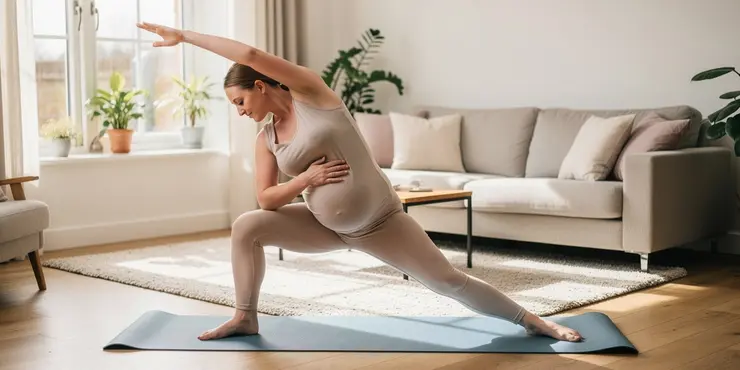
How does exercise benefit pregnancy?
Relevance: 100%
-

Can I do abdominal exercises during pregnancy?
Relevance: 99%
-

Are there any exercises to avoid during pregnancy?
Relevance: 98%
-

How often should I exercise during pregnancy?
Relevance: 96%
-
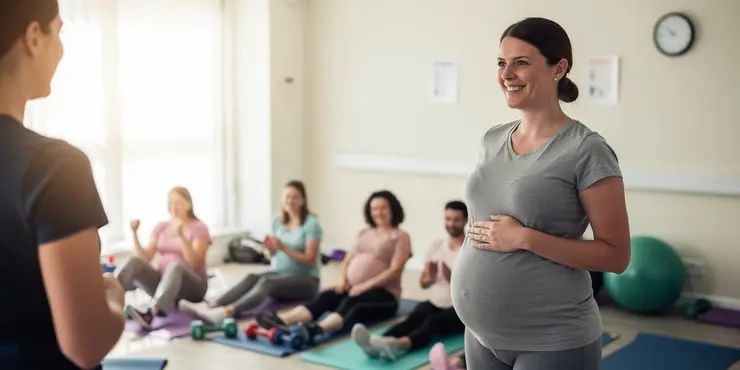
Can I take exercise classes during pregnancy?
Relevance: 94%
-

Do I need to consult a doctor before exercising during pregnancy?
Relevance: 93%
-
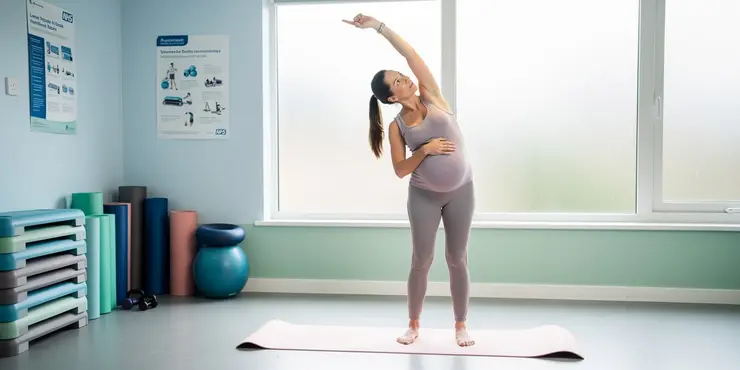
What should I wear for exercising during pregnancy?
Relevance: 92%
-

Is swimming a good exercise during pregnancy?
Relevance: 92%
-

How can I ensure safety during pregnancy exercises?
Relevance: 92%
-
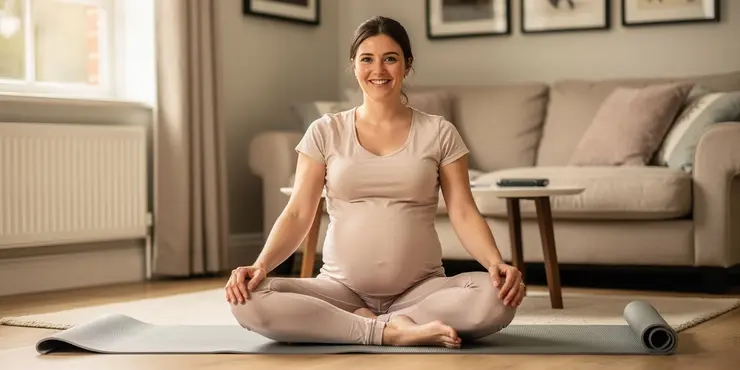
Mat and gym ball exercises with pregnancy related Pelvic Girdle Pain
Relevance: 80%
-

Is cycling safe during pregnancy?
Relevance: 70%
-

Can I do high-impact exercises while pregnant?
Relevance: 70%
-

Can I continue running during pregnancy?
Relevance: 68%
-

Gestational Diabetes during pregnancy
Relevance: 67%
-
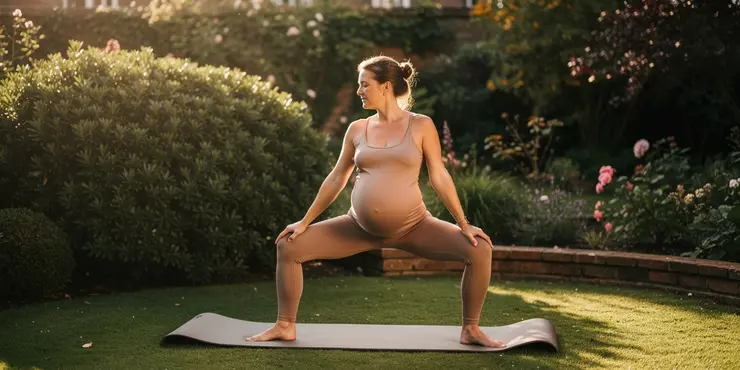
Can exercises help with labor preparation?
Relevance: 67%
-

How soon can a pregnancy test detect pregnancy?
Relevance: 65%
-

Can exercise help prevent gestational diabetes?
Relevance: 65%
-

What if my pregnancy test is positive?
Relevance: 65%
-
What is a pregnancy test?
Relevance: 64%
-
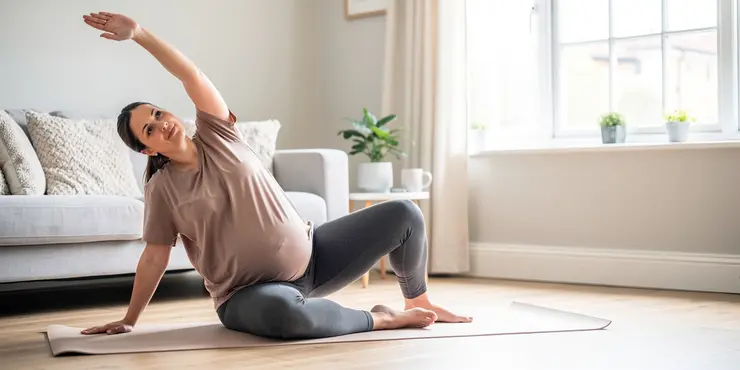
Can lifestyle changes help manage pain and fever during pregnancy?
Relevance: 64%
-

What should I do if I start bleeding during early pregnancy? | NHS
Relevance: 61%
-

Can a pregnancy test expire?
Relevance: 60%
-

HIV and pregnancy | NHS
Relevance: 60%
-

What are the different types of pregnancy tests?
Relevance: 59%
-

How does a pregnancy test work?
Relevance: 59%
-

Can a pregnancy test detect a miscarriage?
Relevance: 59%
-

When should I take a pregnancy test?
Relevance: 58%
-

Can stress affect a pregnancy test result?
Relevance: 58%
-

Can postnatal depression affect subsequent pregnancies?
Relevance: 57%
-

Can medications affect pregnancy test results?
Relevance: 57%
-
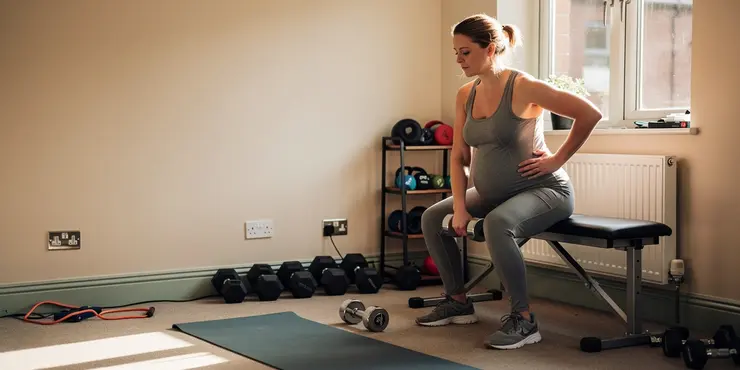
Should I avoid lying on my back during exercise?
Relevance: 56%
-

Can Zika virus affect pregnancy?
Relevance: 56%
-

Does IVF guarantee pregnancy?
Relevance: 56%
-

Nutrition for Pregnancy: What to Eat
Relevance: 55%
-

Do all pregnancy tests detect the same levels of hCG?
Relevance: 54%
-

What if my pregnancy test is negative and I still think I'm pregnant?
Relevance: 54%
-

What can cause a false positive pregnancy test?
Relevance: 54%
-

How can the risks and benefits of medications during pregnancy be assessed?
Relevance: 53%
-
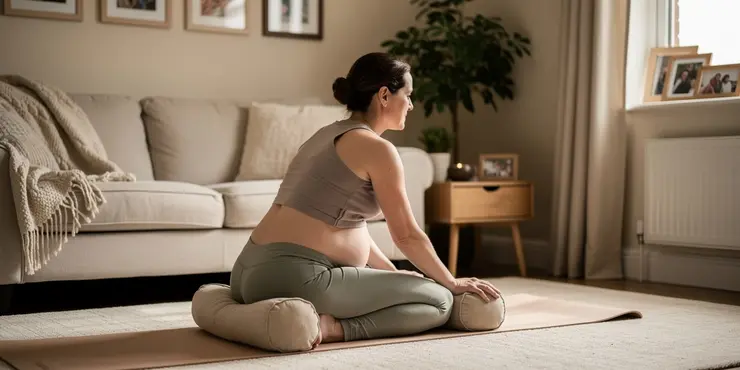
How can I modify my yoga practice during pregnancy?
Relevance: 53%
Introduction to Exercising During Pregnancy
Pregnancy is a unique and special time in a woman's life, marked by significant physical and emotional changes. Staying active can help manage these changes by boosting energy levels, promoting better sleep, and preparing the body for childbirth. However, knowing how often to exercise during pregnancy can be tricky, especially as the body adapts to different stages. In this guide, tailored for a UK audience, we delve into how often you should exercise during pregnancy.
General Guidelines
The NHS recommends that pregnant women aim for at least 150 minutes of moderate-intensity exercise each week. This can be broken down into 30-minute sessions on most days of the week. "Moderate-intensity" means that you should still be able to hold a conversation while exercising but feel slightly out of breath. It’s essential to listen to your body, as the amount and type of exercise that feels comfortable can vary greatly depending on your stage of pregnancy and individual health conditions.
Types of Exercise
There are various types of exercises suitable during pregnancy. Walking, swimming, and prenatal yoga are highly recommended as they are low-impact and can be easily modified. Walking is an excellent way to stay fit and active while enjoying the outdoors. Swimming provides a full-body workout and is gentle on the joints due to the buoyancy of the water. Prenatal yoga helps with flexibility, relaxation, and breathing techniques that can be beneficial during labour.
First Trimester
In the first trimester, many women can continue with their pre-pregnancy exercise routines, but modifications may be necessary, especially if fatigue, nausea, or other symptoms persist. Some women find that they need to reduce the intensity and duration of their workouts during this time. It's important to pace yourself and avoid overheating, especially when exercising indoors or in hot weather.
Second Trimester
During the second trimester, some women may experience an increase in energy levels and choose to engage more in physical activity. It’s a good time to focus on strengthening exercises, particularly those that support the back and core, as they help manage the additional weight and changes in posture. It’s crucial to avoid exercises that involve lying flat on your back and those with a risk of falling.
Third Trimester
In the third trimester, the body prepares for labour and delivery, and some exercises might become more challenging. Gentle activities like walking and swimming remain excellent options. Pay careful attention to comfort and safety, stopping any activities that cause pain or discomfort. Exercises focusing on breathing and relaxation can also be beneficial during this time.
Consulting a Healthcare Professional
Prior to beginning any exercise regime during pregnancy, consult with your healthcare provider, particularly if you have not been active before pregnancy or have any medical conditions. Your midwife or doctor can provide personalized advice based on your health and pregnancy progression. They can also address any concerns you may have and ensure your safety and wellbeing throughout your pregnancy journey.
Introduction to Exercising During Pregnancy
Being pregnant is a special time for a woman. Your body and feelings change a lot. Exercise can help you feel better. It can give you more energy, help you sleep, and get your body ready for birth. But knowing how much to exercise can be hard. This guide, made for people in the UK, will help you understand how often to exercise when you are pregnant.
General Guidelines
The NHS says pregnant women should try to do 150 minutes of moderate exercise each week. This can be split into 30 minutes on most days. "Moderate" means you can still talk, but you might be a little out of breath. Listen to your body. The best exercise for you can change depending on how far along you are in your pregnancy and your health.
Types of Exercise
There are many good exercises you can do when you are pregnant. Walking, swimming, and prenatal yoga are great choices. They are gentle and easy to change if needed. Walking helps you stay active and enjoy being outside. Swimming works out your whole body and is gentle because the water supports you. Prenatal yoga helps you stretch, relax, and learn to breathe well, which is helpful when you have the baby.
First Trimester
In the first few months, many women keep doing what they did before they were pregnant. But if you feel tired or sick, you might need to cut back a bit. Go at your own pace and don't get too hot, especially if it's warm outside or inside.
Second Trimester
In the middle months, some women feel more energy. This is a good time to do exercises that make you stronger, especially for your back and tummy. This helps with the extra weight and changes in how you stand. Do not do exercises where you lie flat on your back or might fall down.
Third Trimester
In the last few months, your body gets ready to give birth. Some exercises can be harder now. Gentle exercises like walking and swimming are still good. Make sure you feel comfortable and safe. Stop doing anything that hurts or feels bad. Focus on breathing and relaxing exercises too.
Consulting a Healthcare Professional
Before starting any exercise plan, talk to your doctor or midwife. This is extra important if you were not active before getting pregnant or if you have health problems. Your doctor can give you advice just for you and help keep you safe and healthy while you are pregnant.
Frequently Asked Questions
How often should I exercise during pregnancy?
Most experts recommend that pregnant women aim for at least 150 minutes of moderate-intensity exercise per week.
Can I exercise every day while pregnant?
Yes, it's generally safe to exercise every day if you are comfortable and have no complications, but ensure each session is not overly strenuous.
Is it safe to exercise during all three trimesters of pregnancy?
Yes, exercise is generally safe throughout pregnancy, but activities and intensity may need adjustment as the pregnancy progresses.
Should I consult my doctor before starting an exercise routine when pregnant?
Yes, consulting your doctor is important, especially if you have pre-existing conditions or pregnancy complications.
What types of exercises are recommended during pregnancy?
Walking, swimming, and prenatal yoga are commonly recommended as they are low-impact and support overall fitness.
Can I continue my regular exercise routine while pregnant?
If you have a regular routine and your doctor approves, you may continue with modifications to accommodate your changing body.
How can I know if I'm exercising too much during pregnancy?
Listen to your body. If you feel pain, dizziness, or shortness of breath, you may be overexerting yourself.
How can I track the intensity of my workouts while pregnant?
Use the ‘talk test’—if you can hold a conversation while exercising, the intensity is likely appropriate.
Are there any exercises to avoid during pregnancy?
Avoid high-impact sports, activities with a risk of falling, or those that involve lying flat on your back after the first trimester.
Do I need to modify exercises as my pregnancy progresses?
Yes, exercises should be adjusted to accommodate changes in balance, energy levels, and physical capacity.
Why is exercise beneficial during pregnancy?
Exercise can improve mood, increase energy levels, reduce common pregnancy discomforts, and promote better sleep.
Should I include strength training in my pregnancy workouts?
Yes, light strength training can be beneficial, but avoid heavy lifting and high-intensity intervals.
How do I stay motivated to exercise during pregnancy?
Set small, achievable goals and choose activities you enjoy. Joining a prenatal exercise class can also help maintain motivation.
Can exercising during pregnancy help with labor and delivery?
Yes, being fit and active can improve endurance and strength, which may aid in labor and delivery.
How much should I hydrate while exercising during pregnancy?
It's crucial to stay hydrated, so drink water before, during, and after exercising to prevent dehydration.
Can I start a new exercise routine while pregnant if I wasn’t active before?
Yes, with your doctor’s approval, you can start with low-intensity activities like walking or prenatal yoga.
Is it okay to do abdominal exercises during pregnancy?
Yes, but focus on core stability and avoid exercises that involve lying on your back after the first trimester.
Is swimming a good exercise option during pregnancy?
Swimming is an excellent option as it provides full-body conditioning, is low-impact, and helps relieve swelling.
Should I monitor my heart rate while exercising during pregnancy?
Instead of heart rate, monitor your exertion level by ensuring you can maintain a conversation during exercise.
Can regular exercise help with post-pregnancy recovery?
Yes, maintaining fitness during pregnancy can ease postnatal recovery and resumption of pre-pregnancy activities.
How often should I exercise when I am pregnant?
It is good to move your body when you are having a baby. Try to do some exercise most days of the week. You can start with 10 minutes and slowly do more.
Walking, swimming, and stretching are great. Listen to your body and rest if you feel tired.
You can ask a doctor or a health worker for help if you are unsure. They can give you tips and help you stay safe.
Experts think that pregnant women should try to do 150 minutes of exercise every week. The exercise should make you breathe a bit faster, but you should still be able to talk.
Here are some ideas to help you:
- Break it up: You can do 30 minutes of exercise on 5 days, or split it into smaller bits like 15 minutes twice a day.
- Use reminders: Set an alarm on your phone to remember your exercise time.
- Exercise with a friend: It can be fun to move with someone else.
Can I work out every day when I am pregnant?
Yes, you can! It's good to stay active when you are pregnant. You can do things like walking or swimming. But first, check with your doctor. Make sure they say it's okay for you.
Here are some tips to help you:
- Listen to your body. Stop if you feel tired or it hurts.
- Drink plenty of water.
- Wear comfy clothes and shoes.
- Do exercises you like, but do them gently.
Using videos or apps can help you exercise safely. Remember, everyone is different, so do what feels right for you!
Yes, it's usually safe to exercise every day if you feel good and have no problems. But make sure you don't exercise too hard.
Can I do exercise when I am pregnant?
You can exercise when you are having a baby. This is called being pregnant.
It is usually safe to exercise during all the times of your pregnancy. This means all three trimesters.
But, ask your doctor first to be sure.
Here are some tips:
- Go slow and don’t push yourself too hard.
- Drink lots of water.
- Stop if you feel pain or dizzy.
Tools to help:
- Watch videos online for easy exercises.
- Join a class for pregnant moms.
Yes, it is usually safe to do exercise when you are pregnant. But, you might need to change what exercises you do and how hard you do them as your pregnancy goes on.
Should I ask my doctor before I start exercising when I am pregnant?
Being pregnant is special, and exercising can be good for you, but it is important to talk to your doctor first. They can tell you what is safe for you and your baby.
Here are some tips to help:
- Use simple exercise routines.
- Listen to your body and rest if you feel tired.
- Drink lots of water.
You can use drawings or videos to understand better which exercises are safe to do.
It is important to talk to your doctor. This is very important if you are already sick or if you are having a baby and there are problems.
What exercises are good when you are pregnant?
When you are going to have a baby, it is good to do some safe exercises. Here are some exercises you can do:
- Walking: Go for a nice walk. It helps your body and makes you feel good.
- Swimming: Swimming is fun and gentle on your body. It makes you strong.
- Yoga: Yoga makes you calm and helps your body stay stretchy.
- Stretching: Simple stretches help your muscles feel good and relaxed.
Before you start, talk to your doctor to make sure the exercises are safe for you and your baby.
Walking, swimming, and doing yoga for pregnant women are good exercises. They are gentle and help keep you fit.
Can I still do my regular exercise if I am pregnant?
If you are going to have a baby, you might wonder if you can still do your exercise. It is good to ask your doctor. Your doctor can tell you what is safe for you and your baby.
Some exercises are safe and good for you. Walking or swimming are often safe. Other exercises might be too hard or not safe. Your doctor will help you decide.
You can use videos or apps to help you exercise safely. They can make exercise easier and more fun!
If your doctor says it's okay, you can keep doing your usual activities. You might just need to change how you do them to fit your body as it changes.
How do I know if I'm doing too much exercise when I'm pregnant?
Here are some tips to help you:
- Listen to your body. If you feel tired, take a break.
- If you feel pain, stop right away.
- Make sure you can still talk while exercising. If you can't, slow down.
- Talk to your doctor. They can tell you what is safe.
You can use tools like a fitness tracker to help monitor your activity and make sure you're not overdoing it.
Pay attention to your body. If you feel pain, feel dizzy, or have trouble breathing, you might be doing too much.
How can I check how hard my exercises are when I’m pregnant?
Try the 'talk test'. If you can talk to someone while you are exercising, you are doing it at the right level.
Should I not do some exercises when pregnant?
Do not do sports that might make you fall down. Stay away from activities where you lie on your back after the first 3 months of being pregnant.
Should I change my exercises as my pregnancy moves forward?
As your pregnancy grows, your body changes. You might need to change your exercises to stay safe and comfy.
Here are some tips:
- Talk to your doctor about what exercises are good for you.
- Listen to your body. If something hurts, stop doing it.
- Try gentle exercises like walking or swimming.
- Use things like a yoga mat or a chair for support.
A supportive tool is a pregnancy exercise app. It can show you safe exercises to do each month.
Yes, exercises should change if your balance, energy, or strength changes.
Why is exercise good when you are pregnant?
Exercise can help you feel happier, give you more energy, make you feel more comfortable during pregnancy, and help you sleep better.
Can I do strength training when I am pregnant?
Yes, you can do strength training when you are pregnant. But, talk to your doctor first.
Strength training can help you feel strong. It can make your muscles work better. Some good exercises are lifting light weights and using resistance bands.
Remember to go slow. Do not lift heavy things.
Here are some tips to make it safe:
- Ask a helper to be with you.
- Take breaks and drink water.
- Stop if something hurts.
Some apps and videos can show you what to do. They can be very helpful.
Yes, doing some light exercises with weights can be good for you. But don't lift really heavy weights or do really hard exercises really fast.
How can I keep wanting to exercise when I'm pregnant?
It can be hard to find energy to exercise when you are pregnant. Here are some simple tips to help:
- Set small goals: Make a list of easy exercises you like. Do a little each day.
- Find a buddy: Exercise with a friend to make it fun. You can help each other stay on track.
- Listen to your body: If you feel tired, it's okay to rest. Do what feels good for you.
- Use apps or videos: There are many free exercise apps and videos for pregnant women. Try them out.
- Celebrate your progress: Give yourself a small reward when you reach your goals.
Remember, it's important to talk to your doctor before starting any new exercise. They can help you choose what's best for you and your baby.
Make small, easy goals you can reach. Pick activities you like. Joining an exercise class for pregnant people can help you stay motivated too.
Can moving your body when you are pregnant help when the baby is born?
Yes, it can help! Here are some tips:
- Go for short walks.
- Try gentle stretching.
- Ask your doctor or nurse for safe exercises.
Using videos or classes can be fun and helpful. Always listen to your body and rest when needed.
Yes, being fit and active can help your body get stronger and healthier. This might make it easier when you are having a baby.
How much should I drink when I exercise and I am pregnant?
When you are pregnant and you exercise, you need to drink enough water.
Here are some tips to help you:
- Drink a glass of water before you start.
- Take small sips while you exercise.
- Drink another glass when you finish.
- If you feel thirsty, drink more.
Using a special water bottle with a straw can help you remember to drink.
It is very important to drink water. Drink water before you exercise, while you exercise, and after you exercise. This will help you stay healthy and not get too thirsty.
Can I start exercising while pregnant if I wasn't doing it before?
Your doctor says it's okay. You can start doing easy exercises like walking or yoga for pregnant people.
Can I do tummy exercises while I'm pregnant?
Yes, you can. But be careful. Work on making your tummy and back strong. Don't do exercises where you lie on your back after the first three months.
Is swimming a good exercise when you are pregnant?
Swimming can be a great way to exercise when you are going to have a baby. It helps you stay healthy and feel good.
Here are some reasons why swimming is good:
- It is gentle on your body and muscles.
- It can help you relax and feel less stressed.
- It is fun and can make you happy.
Before you start, talk to your doctor. It is important to make sure swimming is safe for you and your baby.
If you find it hard to read or understand, you can:
- Ask someone to read it with you.
- Use pictures or videos to help you understand.
- Take breaks if you feel tired.
Swimming is a great way to exercise. It uses your whole body, is gentle on your joints, and can help reduce swelling.
Is it important to check my heart rate when I exercise while pregnant?
Instead of checking your heart rate, make sure you can talk while you are exercising. This helps you see how hard you are working.
Can exercise help after having a baby?
Yes, staying fit when you are pregnant can help you feel better after the baby is born and make it easier to get back to doing things you did before you were pregnant.
Useful Links
This website offers general information and is not a substitute for professional advice.
Always seek guidance from qualified professionals.
If you have any medical concerns or need urgent help, contact a healthcare professional or emergency services immediately.
Some of this content was generated with AI assistance. We’ve done our best to keep it accurate, helpful, and human-friendly.
- Ergsy carfully checks the information in the videos we provide here.
- Videos shown by Youtube after a video has completed, have NOT been reviewed by ERGSY.
- To view, click the arrow in centre of video.
- Most of the videos you find here will have subtitles and/or closed captions available.
- You may need to turn these on, and choose your preferred language.
- Go to the video you'd like to watch.
- If closed captions (CC) are available, settings will be visible on the bottom right of the video player.
- To turn on Captions, click settings .
- To turn off Captions, click settings again.
More Items From Ergsy search
-

What exercises can I do during pregnancy?
Relevance: 100%
-

How does exercise benefit pregnancy?
Relevance: 100%
-

Can I do abdominal exercises during pregnancy?
Relevance: 99%
-

Are there any exercises to avoid during pregnancy?
Relevance: 98%
-

How often should I exercise during pregnancy?
Relevance: 96%
-

Can I take exercise classes during pregnancy?
Relevance: 94%
-

Do I need to consult a doctor before exercising during pregnancy?
Relevance: 93%
-

What should I wear for exercising during pregnancy?
Relevance: 92%
-

Is swimming a good exercise during pregnancy?
Relevance: 92%
-

How can I ensure safety during pregnancy exercises?
Relevance: 92%
-

Mat and gym ball exercises with pregnancy related Pelvic Girdle Pain
Relevance: 80%
-

Is cycling safe during pregnancy?
Relevance: 70%
-

Can I do high-impact exercises while pregnant?
Relevance: 70%
-

Can I continue running during pregnancy?
Relevance: 68%
-

Gestational Diabetes during pregnancy
Relevance: 67%
-

Can exercises help with labor preparation?
Relevance: 67%
-

How soon can a pregnancy test detect pregnancy?
Relevance: 65%
-

Can exercise help prevent gestational diabetes?
Relevance: 65%
-

What if my pregnancy test is positive?
Relevance: 65%
-
What is a pregnancy test?
Relevance: 64%
-

Can lifestyle changes help manage pain and fever during pregnancy?
Relevance: 64%
-

What should I do if I start bleeding during early pregnancy? | NHS
Relevance: 61%
-

Can a pregnancy test expire?
Relevance: 60%
-

HIV and pregnancy | NHS
Relevance: 60%
-

What are the different types of pregnancy tests?
Relevance: 59%
-

How does a pregnancy test work?
Relevance: 59%
-

Can a pregnancy test detect a miscarriage?
Relevance: 59%
-

When should I take a pregnancy test?
Relevance: 58%
-

Can stress affect a pregnancy test result?
Relevance: 58%
-

Can postnatal depression affect subsequent pregnancies?
Relevance: 57%
-

Can medications affect pregnancy test results?
Relevance: 57%
-

Should I avoid lying on my back during exercise?
Relevance: 56%
-

Can Zika virus affect pregnancy?
Relevance: 56%
-

Does IVF guarantee pregnancy?
Relevance: 56%
-

Nutrition for Pregnancy: What to Eat
Relevance: 55%
-

Do all pregnancy tests detect the same levels of hCG?
Relevance: 54%
-

What if my pregnancy test is negative and I still think I'm pregnant?
Relevance: 54%
-

What can cause a false positive pregnancy test?
Relevance: 54%
-

How can the risks and benefits of medications during pregnancy be assessed?
Relevance: 53%
-

How can I modify my yoga practice during pregnancy?
Relevance: 53%


